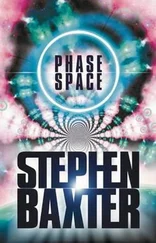Gagarin whooped. He said: ‘ Poyekhali!’ – ‘Off we go!’
He heard an exultant reply from the control centre, but could make out no words.
Now the rockets’ roar engulfed him. Acceleration settled on his chest, mounting rapidly.
Already, he knew, strapped to this ICBM, he was travelling faster than any human in history.
He felt the booster pitch over as it climbed. After two minutes there was a clatter of explosive bolts, a dip in the acceleration. Staging: the four strap-on liquid rocket boosters had been discarded.
He was already more than fifty kilometres high.
Now the main core of the A-1 burned under him, and as the mass of the ship decreased the acceleration built up, to four, five, six times gravity. But Gagarin was just twenty-seven, fit as an ox, and he could feel how his taut muscles absorbed the punishment easily. He maintained steady reports, and he was proud of the control in his voice.
Cocooned in the artificial light of his cabin, exhilarated and in control, he grinned through the mounting pain.
Swallow ’s protective shroud cracked open. He could see fragments of ice, shaken free of the hull of the booster; they glittered around the craft like snow.
At five minutes the acceleration died, and Gagarin was hurled forward against his restraints. He heard rattles as the main booster core was discarded. Then came the crisp surge of the ‘half stage’ which would, at last, carry him to space.
Gagarin felt his speed mount, impossibly rapidly.
Then the final stage died. He was thrown forward again, and he grunted.
The automatic orientation system switched on. Swallow locked its sensor on the sun, and swivelled in space; he could feel the movement, as gentle and assured as if he was a child in the womb, carried by his mother’s strong muscles, and he knew he was in orbit.
It was done. And, as the ship turned, he could see the skin of Earth, spread out beneath him like a glowing carpet.
‘Oh my,’ he said. ‘Oh my. What a beautiful sight.’
That was when the voices started.
… Much was made of the fact that Yuri Gagarin was an ordinary citizen of the Soviet Union. He was born in the Gzhatsk District of Smolensk and entered secondary school in 1941. But his studies were interrupted by the German invasion. After the Second World War Gagarin’s family moved to Gzhatsk, where Yuri resumed his studies. In 1951 he graduated with honours from a vocational school in the town of Lyubersy, near Moscow. He received a foundryman’s certificate. He then studied at an industrial technical school in Saratov, on the Volga, from which he graduated with honours in 1955. It was while attending the industrial school that the man who would be the first to fly in space took his first steps in aviation, when he commenced a course of training at the Saratov Aero Club in 1955 …
Voices – chattering and whispering around the capsule – as if he was dreaming. Was this some artefact of weightlessness, of the radiations of space?
The voices faded.
… And yet this was dream-like, voices or no voices. Here he was falling around the Earth, at a height nobody had approached before. And objects were drifting around him in the cabin: papers, a pencil, a small notebook, comical in their ordinariness, pushed this way and that by tugs of air from his life-support fans. This was weightlessness, a sensation no human had experienced before.
Briefly, he was overwhelmed with strangeness.
And yet he felt no ill-effects, no disorientation; it was remarkably comfortable, and he knew it would be possible to do good work here, even to build the cities in space of which the designers dreamed.
He would complete a single orbit of the Earth, passing across Siberia, Japan, the tip of South America, and west Africa.
He peered out eagerly, watching Earth as no man had seen it before. There were clouds piled thickly around the equator, reaching up to him. Over the baked heart of the Soviet Union he could see the big squares of the collective farms, and he could distinguish ploughed land from meadows. It would take twenty minutes, of his orbit’s ninety, just to cross the vast expanse of his homeland.
The Earth seemed very near, even from two hundred kilometres.
… And again he heard a voice – this time his own, somehow echoing back at him, from somewhere beyond the hull of the spacecraft: We are peace-loving people and are doing everything for the sake of peace. The Soviet man – be he a geologist, polar explorer, builder of power stations, factories or plants, or space engineer and pilot – is always a seeker …
The voice, echoing as if around some gigantic museum, faded and vanished.
He felt irritation, mixed with apprehension. Strange voices were not in the flight plan! He had not been trained for this! He had no desire for his mission to be compromised by the unexpected!
The voices could not, of course, have been real. He was cocooned in this little craft like a doll in wood shavings. The padded walls of his cabin were just centimetres from his gloved fingers. Beyond that, there was nothing, for hundreds of kilometres …
And yet, it was as if, briefly, he had no longer been alone. And still that feeling refused to leave him; suddenly the Vostok seemed small and absurdly fragile – a prison, not a refuge.
As if someone was watching him.
For the first time in the mission, he felt the breath of fear. Perhaps, as the psychologists had warned, the experience of his catapulting launch from the Earth had affected him more deeply than he had anticipated.
He put his uneasiness aside, and fulfilled his duties. He reported the readings of his instruments. He tried to describe what he saw and felt. Weightlessness was ‘relaxing’, he said. And so it was: with his restraints loosened, floating above his couch, Gagarin felt as if he was flying his favoured MiG-15, low over the birch trees around Star City.
He recorded his observations in a log-book and on tape. His handwriting had not changed – here in space it was just as it had been on Earth, just as he had learned so long ago in the schools of Klushino – but he had to hold the writing block or it would float away from his hands.
And he maintained his stream of messages, for the people of Earth. ‘ … The present generation will witness how the free and conscious labour of the people of the new socialist society turns even the most daring of mankind’s dreams into reality. To reach into space is a historical process which mankind is carrying out in accordance with the laws of natural development …’
Even as he spoke, he studied Earth through his Vzor telescope.
White clouds, curved blue sea: the dominant impression. The clouds’ white was so brilliant it hurt his eyes to look at the thickest layers too long, as if a new sun was burning from beneath them, on the surface of the Earth. And the blue was of an extraordinary intensity, somehow hard to study and analyse. The light was so bright it dazzled him, making it impossible to see the stars; thus, the Earth turned, as it always had, beneath a canopy of black sky.
It was easier to look at the land, where the colours were more subtle, greys and browns and faded greens. It seemed as if the green of vegetation was somehow filtered by the layer of air. Cultivated areas seemed to be a dull sage green, while bare earth was a tan brown, deepening to brick red. Cities were bubbly grey, their boundaries blurred. He was struck by the land’s flatness, the way it barely seemed to protrude above the ocean’s skin … There was truly little separating land and sea.
But it was hard to be analytical, up here, on the ultimate flight; it was enough simply to watch.
Читать дальше












